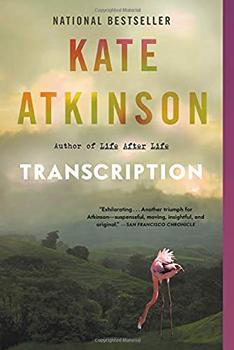Page 1 of 1
There are currently 2 reader reviews for Transcription
Write your own review!
M Kassapa
Opposites Attract
For me, the funny thing about Transcription is that I don't particularly like Kate Atkinson's style and yet the story is so fun and engaging with wonderful turns and twists that I simply could not put it down and enjoyed the book thoroughly to the very last word.
 Cloggie Downunder
Another Atkinson masterpiece.
Cloggie Downunder
Another Atkinson masterpiece.
Transcription is the fourth stand-alone novel by award-winning British author, Kate Atkinson. In 1940, eighteen-year-old Juliet Armstrong finds herself recruited into the Secret Service. Mostly it’s fairly boring, typing up reports and transcribing recordings of agents meeting with British Nazi-sympathisers. But then she’s given another identity and the work gets more interesting, for a while. After one exciting episode, arrests are made.
But there were some incidents about which Juliet doesn’t like to think too much, and when the war ends, she’s not sorry to leave it all behind. Five years later, Juliet is working for the BBC producing children’s programs when a face from the past appears: the man who posed as the Gestapo contact passes her in the street. What is disconcerting is that he pretends not to know her.
On the heels of this, a somewhat threatening note is delivered, more of her former colleagues from MI5 flit in and out, and she feels sure she is being followed. Frustrated for information from official channels, Juliet decides to become the hunter rather than the prey.
Once again, Atkinson gives the reader a plot that is perfectly plausible, but filled with twists and red herrings. Her depiction of London during the war and in the immediate aftermath has an authentic feel, with the social attitudes portrayed appropriate for the era. Her protagonist is easily believable: Juliet is intelligent but still naïve, although perhaps not quite as innocent as she first seems.
Her descriptive prose is excellent, as always, and Atkinson no doubt delighted in dropping this piece of dialogue in the final pages: “Fisher clapped his hands, as if to signal the end of the entertainment and said, ‘Come now, quite enough of exposition and explanation. We’re not approaching the end of a novel, Miss Armstrong.’” Another Atkinson masterpiece.
